Evaluation Framework for Practice Development in Nursing: A Report
VerifiedAdded on 2020/06/05
|10
|2612
|305
Report
AI Summary
This report provides a comprehensive analysis of practice development within the nursing and healthcare sectors, emphasizing the importance of evaluation frameworks. It delves into the work of McCormack, Manley, and Titchen, defining practice development and its significance in improving patient care. The report explores key principles such as person-centred care, evidence-based practices, and the integration of micro-system level approaches. It highlights various evaluation frameworks, including shared values and vision, engaged stakeholders, extendibility, and ontological completeness, alongside critical companionship and shared decision-making models. The report further outlines a detailed evaluation plan, encompassing stages such as setting goals, resource evaluation, formulating evaluation questions, measuring outcomes, data collection methods, ethical considerations, data analysis, timelines, role assignments, result dissemination strategies, and the development of recommendations. The discussion underscores the need for continuous improvement in healthcare practices to enhance the quality of care and meet patient needs effectively. This report is a valuable resource for students seeking to understand and apply evaluation frameworks in the context of nursing and healthcare practice development.
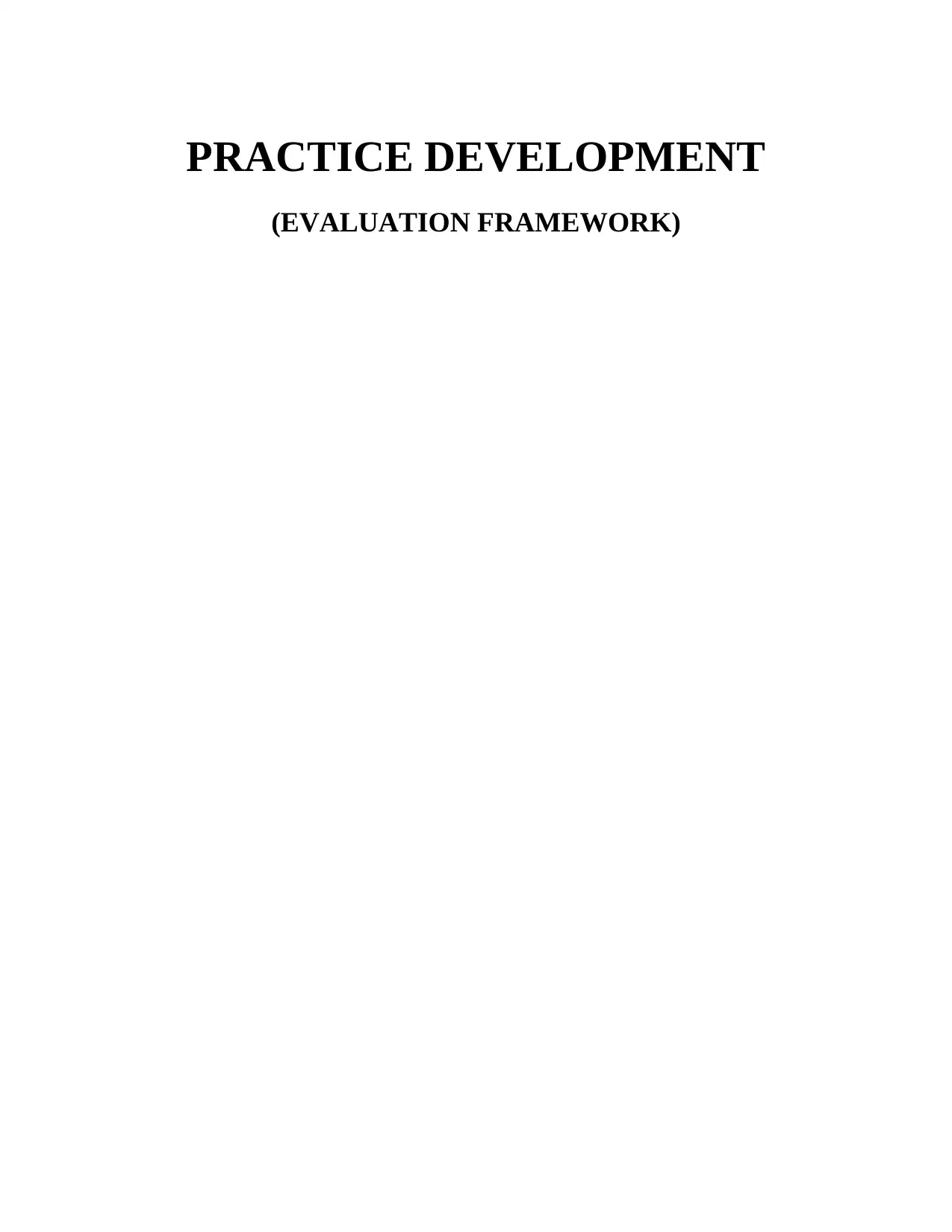
PRACTICE DEVELOPMENT
(EVALUATION FRAMEWORK)
(EVALUATION FRAMEWORK)
Paraphrase This Document
Need a fresh take? Get an instant paraphrase of this document with our AI Paraphraser
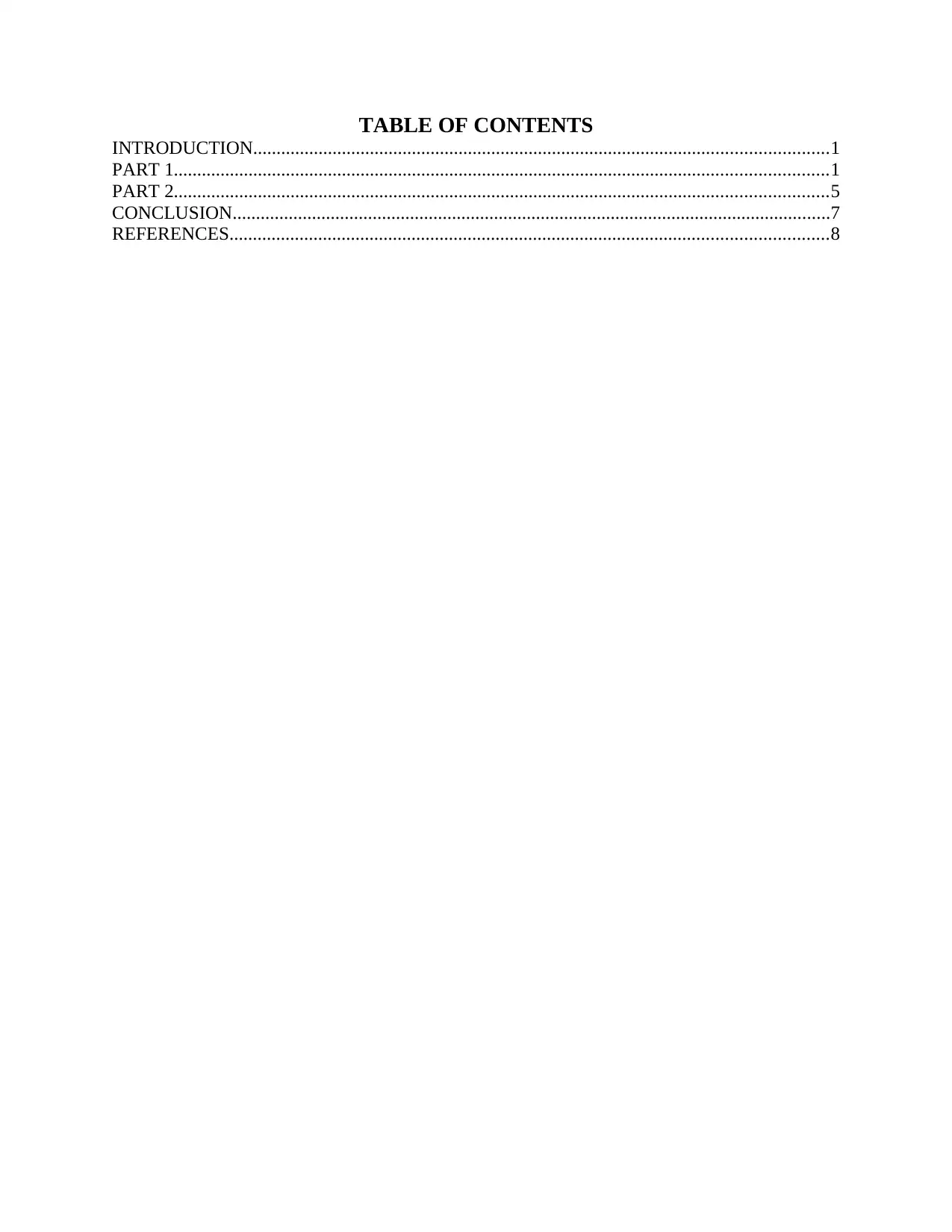
TABLE OF CONTENTS
INTRODUCTION...........................................................................................................................1
PART 1............................................................................................................................................1
PART 2............................................................................................................................................5
CONCLUSION................................................................................................................................7
REFERENCES................................................................................................................................8
INTRODUCTION...........................................................................................................................1
PART 1............................................................................................................................................1
PART 2............................................................................................................................................5
CONCLUSION................................................................................................................................7
REFERENCES................................................................................................................................8
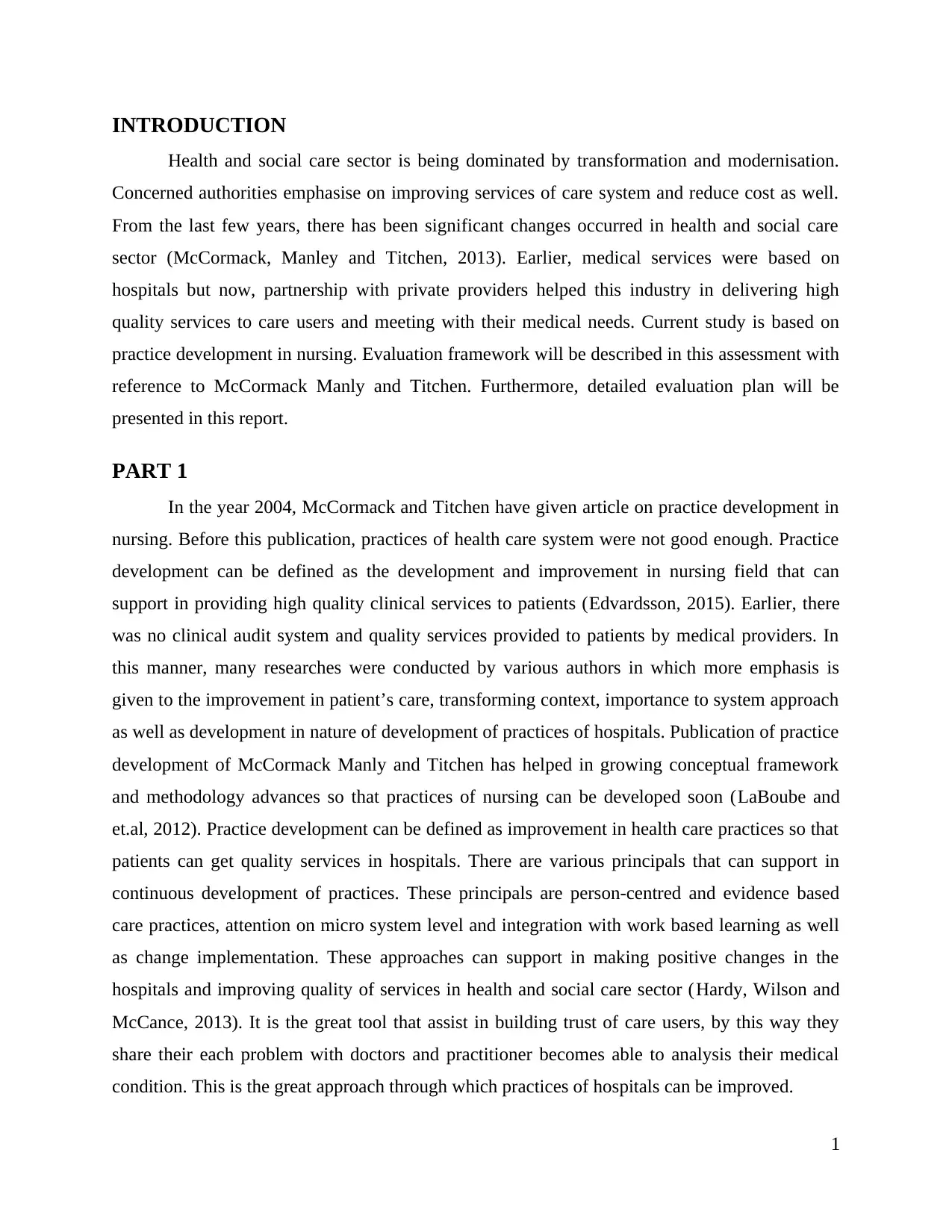
INTRODUCTION
Health and social care sector is being dominated by transformation and modernisation.
Concerned authorities emphasise on improving services of care system and reduce cost as well.
From the last few years, there has been significant changes occurred in health and social care
sector (McCormack, Manley and Titchen, 2013). Earlier, medical services were based on
hospitals but now, partnership with private providers helped this industry in delivering high
quality services to care users and meeting with their medical needs. Current study is based on
practice development in nursing. Evaluation framework will be described in this assessment with
reference to McCormack Manly and Titchen. Furthermore, detailed evaluation plan will be
presented in this report.
PART 1
In the year 2004, McCormack and Titchen have given article on practice development in
nursing. Before this publication, practices of health care system were not good enough. Practice
development can be defined as the development and improvement in nursing field that can
support in providing high quality clinical services to patients (Edvardsson, 2015). Earlier, there
was no clinical audit system and quality services provided to patients by medical providers. In
this manner, many researches were conducted by various authors in which more emphasis is
given to the improvement in patient’s care, transforming context, importance to system approach
as well as development in nature of development of practices of hospitals. Publication of practice
development of McCormack Manly and Titchen has helped in growing conceptual framework
and methodology advances so that practices of nursing can be developed soon (LaBoube and
et.al, 2012). Practice development can be defined as improvement in health care practices so that
patients can get quality services in hospitals. There are various principals that can support in
continuous development of practices. These principals are person-centred and evidence based
care practices, attention on micro system level and integration with work based learning as well
as change implementation. These approaches can support in making positive changes in the
hospitals and improving quality of services in health and social care sector (Hardy, Wilson and
McCance, 2013). It is the great tool that assist in building trust of care users, by this way they
share their each problem with doctors and practitioner becomes able to analysis their medical
condition. This is the great approach through which practices of hospitals can be improved.
1
Health and social care sector is being dominated by transformation and modernisation.
Concerned authorities emphasise on improving services of care system and reduce cost as well.
From the last few years, there has been significant changes occurred in health and social care
sector (McCormack, Manley and Titchen, 2013). Earlier, medical services were based on
hospitals but now, partnership with private providers helped this industry in delivering high
quality services to care users and meeting with their medical needs. Current study is based on
practice development in nursing. Evaluation framework will be described in this assessment with
reference to McCormack Manly and Titchen. Furthermore, detailed evaluation plan will be
presented in this report.
PART 1
In the year 2004, McCormack and Titchen have given article on practice development in
nursing. Before this publication, practices of health care system were not good enough. Practice
development can be defined as the development and improvement in nursing field that can
support in providing high quality clinical services to patients (Edvardsson, 2015). Earlier, there
was no clinical audit system and quality services provided to patients by medical providers. In
this manner, many researches were conducted by various authors in which more emphasis is
given to the improvement in patient’s care, transforming context, importance to system approach
as well as development in nature of development of practices of hospitals. Publication of practice
development of McCormack Manly and Titchen has helped in growing conceptual framework
and methodology advances so that practices of nursing can be developed soon (LaBoube and
et.al, 2012). Practice development can be defined as improvement in health care practices so that
patients can get quality services in hospitals. There are various principals that can support in
continuous development of practices. These principals are person-centred and evidence based
care practices, attention on micro system level and integration with work based learning as well
as change implementation. These approaches can support in making positive changes in the
hospitals and improving quality of services in health and social care sector (Hardy, Wilson and
McCance, 2013). It is the great tool that assist in building trust of care users, by this way they
share their each problem with doctors and practitioner becomes able to analysis their medical
condition. This is the great approach through which practices of hospitals can be improved.
1
⊘ This is a preview!⊘
Do you want full access?
Subscribe today to unlock all pages.

Trusted by 1+ million students worldwide
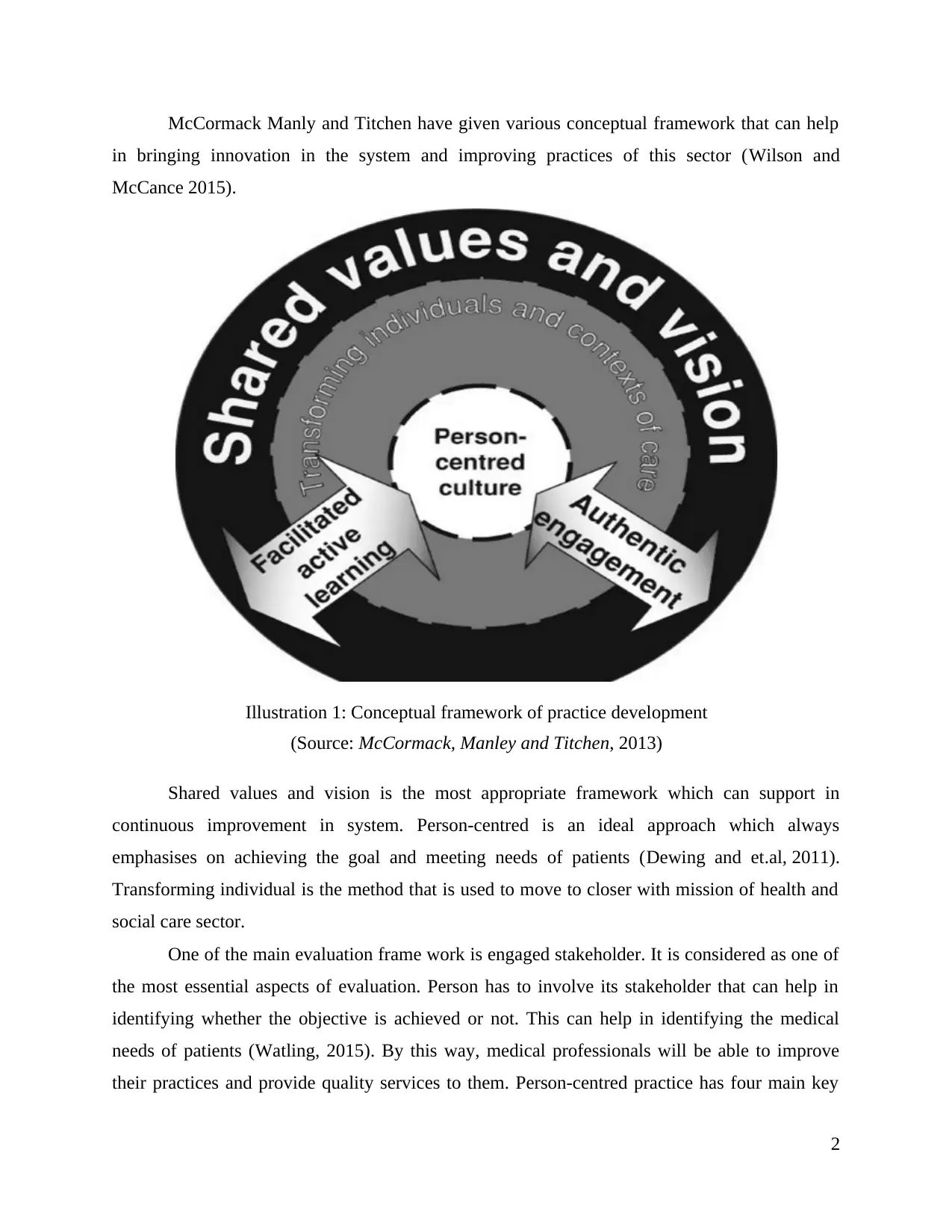
McCormack Manly and Titchen have given various conceptual framework that can help
in bringing innovation in the system and improving practices of this sector (Wilson and
McCance 2015).
Illustration 1: Conceptual framework of practice development
(Source: McCormack, Manley and Titchen, 2013)
Shared values and vision is the most appropriate framework which can support in
continuous improvement in system. Person-centred is an ideal approach which always
emphasises on achieving the goal and meeting needs of patients (Dewing and et.al, 2011).
Transforming individual is the method that is used to move to closer with mission of health and
social care sector.
One of the main evaluation frame work is engaged stakeholder. It is considered as one of
the most essential aspects of evaluation. Person has to involve its stakeholder that can help in
identifying whether the objective is achieved or not. This can help in identifying the medical
needs of patients (Watling, 2015). By this way, medical professionals will be able to improve
their practices and provide quality services to them. Person-centred practice has four main key
2
in bringing innovation in the system and improving practices of this sector (Wilson and
McCance 2015).
Illustration 1: Conceptual framework of practice development
(Source: McCormack, Manley and Titchen, 2013)
Shared values and vision is the most appropriate framework which can support in
continuous improvement in system. Person-centred is an ideal approach which always
emphasises on achieving the goal and meeting needs of patients (Dewing and et.al, 2011).
Transforming individual is the method that is used to move to closer with mission of health and
social care sector.
One of the main evaluation frame work is engaged stakeholder. It is considered as one of
the most essential aspects of evaluation. Person has to involve its stakeholder that can help in
identifying whether the objective is achieved or not. This can help in identifying the medical
needs of patients (Watling, 2015). By this way, medical professionals will be able to improve
their practices and provide quality services to them. Person-centred practice has four main key
2
Paraphrase This Document
Need a fresh take? Get an instant paraphrase of this document with our AI Paraphraser
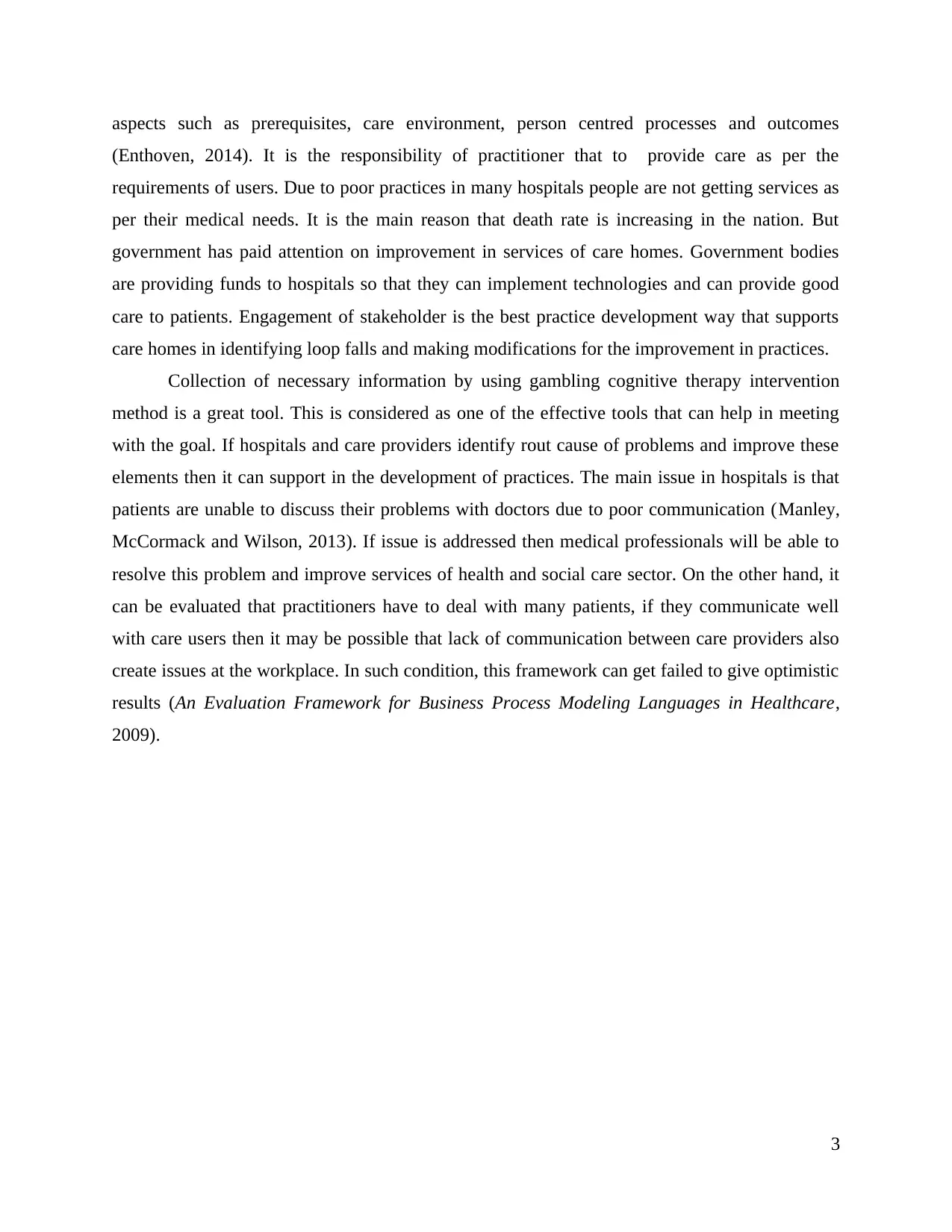
aspects such as prerequisites, care environment, person centred processes and outcomes
(Enthoven, 2014). It is the responsibility of practitioner that to provide care as per the
requirements of users. Due to poor practices in many hospitals people are not getting services as
per their medical needs. It is the main reason that death rate is increasing in the nation. But
government has paid attention on improvement in services of care homes. Government bodies
are providing funds to hospitals so that they can implement technologies and can provide good
care to patients. Engagement of stakeholder is the best practice development way that supports
care homes in identifying loop falls and making modifications for the improvement in practices.
Collection of necessary information by using gambling cognitive therapy intervention
method is a great tool. This is considered as one of the effective tools that can help in meeting
with the goal. If hospitals and care providers identify rout cause of problems and improve these
elements then it can support in the development of practices. The main issue in hospitals is that
patients are unable to discuss their problems with doctors due to poor communication (Manley,
McCormack and Wilson, 2013). If issue is addressed then medical professionals will be able to
resolve this problem and improve services of health and social care sector. On the other hand, it
can be evaluated that practitioners have to deal with many patients, if they communicate well
with care users then it may be possible that lack of communication between care providers also
create issues at the workplace. In such condition, this framework can get failed to give optimistic
results (An Evaluation Framework for Business Process Modeling Languages in Healthcare,
2009).
3
(Enthoven, 2014). It is the responsibility of practitioner that to provide care as per the
requirements of users. Due to poor practices in many hospitals people are not getting services as
per their medical needs. It is the main reason that death rate is increasing in the nation. But
government has paid attention on improvement in services of care homes. Government bodies
are providing funds to hospitals so that they can implement technologies and can provide good
care to patients. Engagement of stakeholder is the best practice development way that supports
care homes in identifying loop falls and making modifications for the improvement in practices.
Collection of necessary information by using gambling cognitive therapy intervention
method is a great tool. This is considered as one of the effective tools that can help in meeting
with the goal. If hospitals and care providers identify rout cause of problems and improve these
elements then it can support in the development of practices. The main issue in hospitals is that
patients are unable to discuss their problems with doctors due to poor communication (Manley,
McCormack and Wilson, 2013). If issue is addressed then medical professionals will be able to
resolve this problem and improve services of health and social care sector. On the other hand, it
can be evaluated that practitioners have to deal with many patients, if they communicate well
with care users then it may be possible that lack of communication between care providers also
create issues at the workplace. In such condition, this framework can get failed to give optimistic
results (An Evaluation Framework for Business Process Modeling Languages in Healthcare,
2009).
3
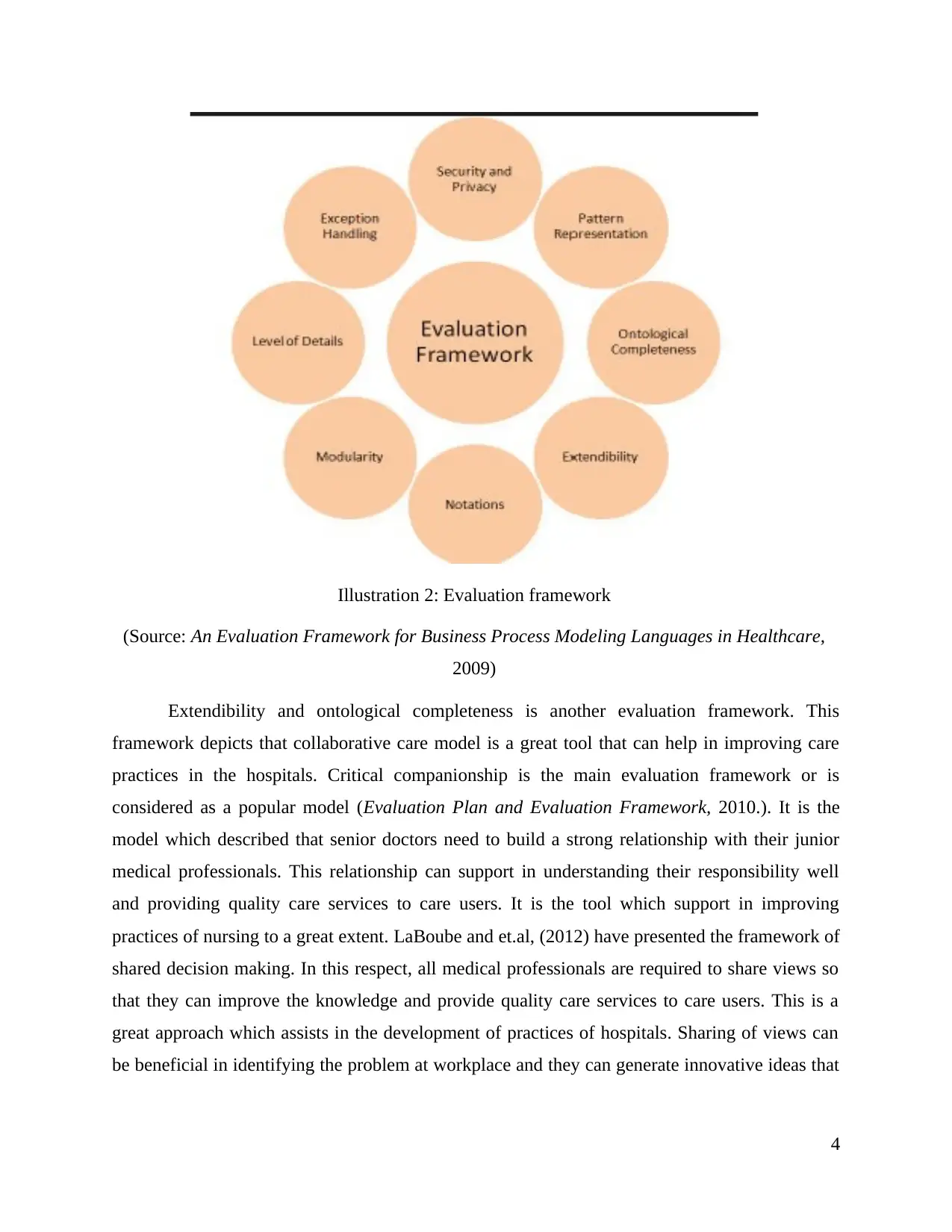
Illustration 2: Evaluation framework
(Source: An Evaluation Framework for Business Process Modeling Languages in Healthcare,
2009)
Extendibility and ontological completeness is another evaluation framework. This
framework depicts that collaborative care model is a great tool that can help in improving care
practices in the hospitals. Critical companionship is the main evaluation framework or is
considered as a popular model (Evaluation Plan and Evaluation Framework, 2010.). It is the
model which described that senior doctors need to build a strong relationship with their junior
medical professionals. This relationship can support in understanding their responsibility well
and providing quality care services to care users. It is the tool which support in improving
practices of nursing to a great extent. LaBoube and et.al, (2012) have presented the framework of
shared decision making. In this respect, all medical professionals are required to share views so
that they can improve the knowledge and provide quality care services to care users. This is a
great approach which assists in the development of practices of hospitals. Sharing of views can
be beneficial in identifying the problem at workplace and they can generate innovative ideas that
4
(Source: An Evaluation Framework for Business Process Modeling Languages in Healthcare,
2009)
Extendibility and ontological completeness is another evaluation framework. This
framework depicts that collaborative care model is a great tool that can help in improving care
practices in the hospitals. Critical companionship is the main evaluation framework or is
considered as a popular model (Evaluation Plan and Evaluation Framework, 2010.). It is the
model which described that senior doctors need to build a strong relationship with their junior
medical professionals. This relationship can support in understanding their responsibility well
and providing quality care services to care users. It is the tool which support in improving
practices of nursing to a great extent. LaBoube and et.al, (2012) have presented the framework of
shared decision making. In this respect, all medical professionals are required to share views so
that they can improve the knowledge and provide quality care services to care users. This is a
great approach which assists in the development of practices of hospitals. Sharing of views can
be beneficial in identifying the problem at workplace and they can generate innovative ideas that
4
⊘ This is a preview!⊘
Do you want full access?
Subscribe today to unlock all pages.

Trusted by 1+ million students worldwide
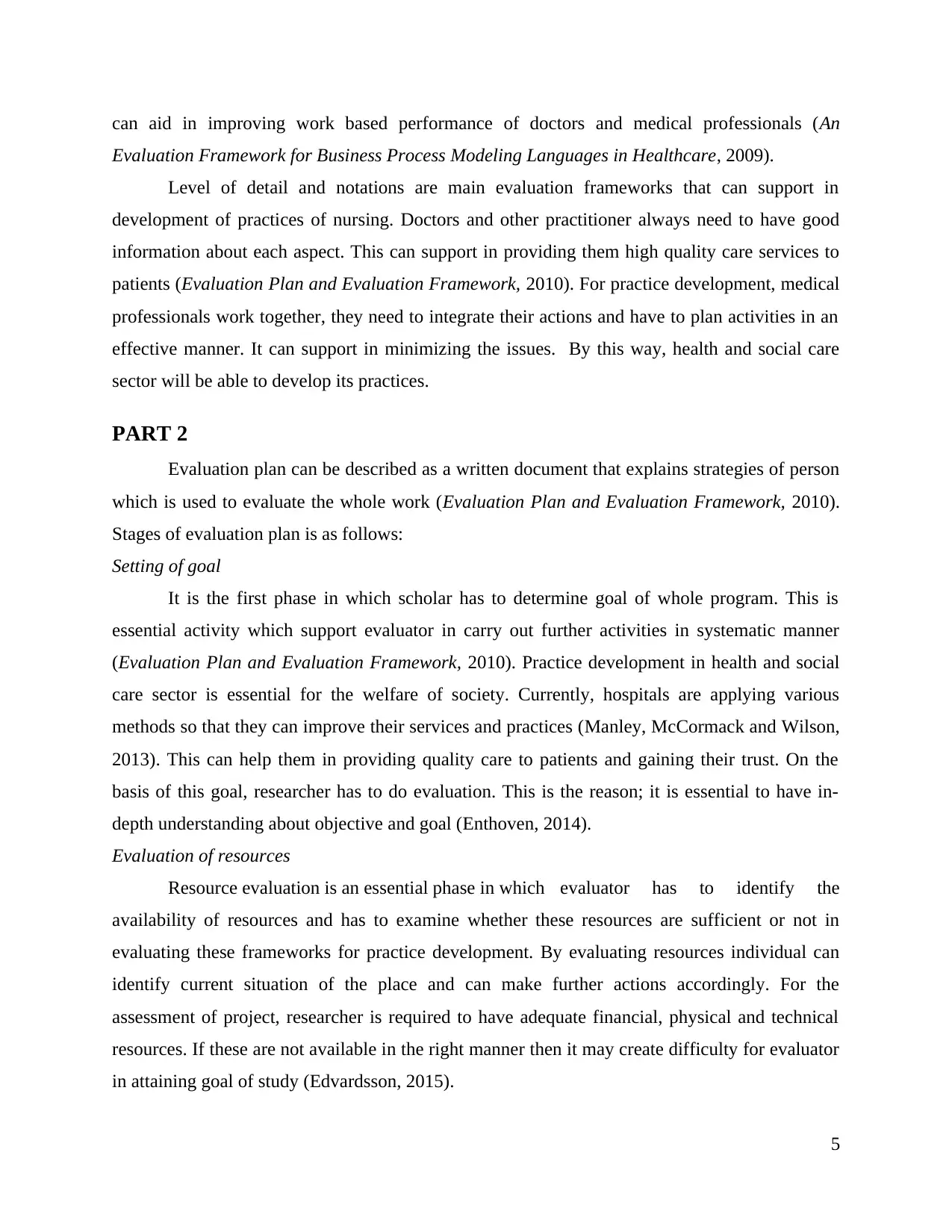
can aid in improving work based performance of doctors and medical professionals (An
Evaluation Framework for Business Process Modeling Languages in Healthcare, 2009).
Level of detail and notations are main evaluation frameworks that can support in
development of practices of nursing. Doctors and other practitioner always need to have good
information about each aspect. This can support in providing them high quality care services to
patients (Evaluation Plan and Evaluation Framework, 2010). For practice development, medical
professionals work together, they need to integrate their actions and have to plan activities in an
effective manner. It can support in minimizing the issues. By this way, health and social care
sector will be able to develop its practices.
PART 2
Evaluation plan can be described as a written document that explains strategies of person
which is used to evaluate the whole work (Evaluation Plan and Evaluation Framework, 2010).
Stages of evaluation plan is as follows:
Setting of goal
It is the first phase in which scholar has to determine goal of whole program. This is
essential activity which support evaluator in carry out further activities in systematic manner
(Evaluation Plan and Evaluation Framework, 2010). Practice development in health and social
care sector is essential for the welfare of society. Currently, hospitals are applying various
methods so that they can improve their services and practices (Manley, McCormack and Wilson,
2013). This can help them in providing quality care to patients and gaining their trust. On the
basis of this goal, researcher has to do evaluation. This is the reason; it is essential to have in-
depth understanding about objective and goal (Enthoven, 2014).
Evaluation of resources
Resource evaluation is an essential phase in which evaluator has to identify the
availability of resources and has to examine whether these resources are sufficient or not in
evaluating these frameworks for practice development. By evaluating resources individual can
identify current situation of the place and can make further actions accordingly. For the
assessment of project, researcher is required to have adequate financial, physical and technical
resources. If these are not available in the right manner then it may create difficulty for evaluator
in attaining goal of study (Edvardsson, 2015).
5
Evaluation Framework for Business Process Modeling Languages in Healthcare, 2009).
Level of detail and notations are main evaluation frameworks that can support in
development of practices of nursing. Doctors and other practitioner always need to have good
information about each aspect. This can support in providing them high quality care services to
patients (Evaluation Plan and Evaluation Framework, 2010). For practice development, medical
professionals work together, they need to integrate their actions and have to plan activities in an
effective manner. It can support in minimizing the issues. By this way, health and social care
sector will be able to develop its practices.
PART 2
Evaluation plan can be described as a written document that explains strategies of person
which is used to evaluate the whole work (Evaluation Plan and Evaluation Framework, 2010).
Stages of evaluation plan is as follows:
Setting of goal
It is the first phase in which scholar has to determine goal of whole program. This is
essential activity which support evaluator in carry out further activities in systematic manner
(Evaluation Plan and Evaluation Framework, 2010). Practice development in health and social
care sector is essential for the welfare of society. Currently, hospitals are applying various
methods so that they can improve their services and practices (Manley, McCormack and Wilson,
2013). This can help them in providing quality care to patients and gaining their trust. On the
basis of this goal, researcher has to do evaluation. This is the reason; it is essential to have in-
depth understanding about objective and goal (Enthoven, 2014).
Evaluation of resources
Resource evaluation is an essential phase in which evaluator has to identify the
availability of resources and has to examine whether these resources are sufficient or not in
evaluating these frameworks for practice development. By evaluating resources individual can
identify current situation of the place and can make further actions accordingly. For the
assessment of project, researcher is required to have adequate financial, physical and technical
resources. If these are not available in the right manner then it may create difficulty for evaluator
in attaining goal of study (Edvardsson, 2015).
5
Paraphrase This Document
Need a fresh take? Get an instant paraphrase of this document with our AI Paraphraser
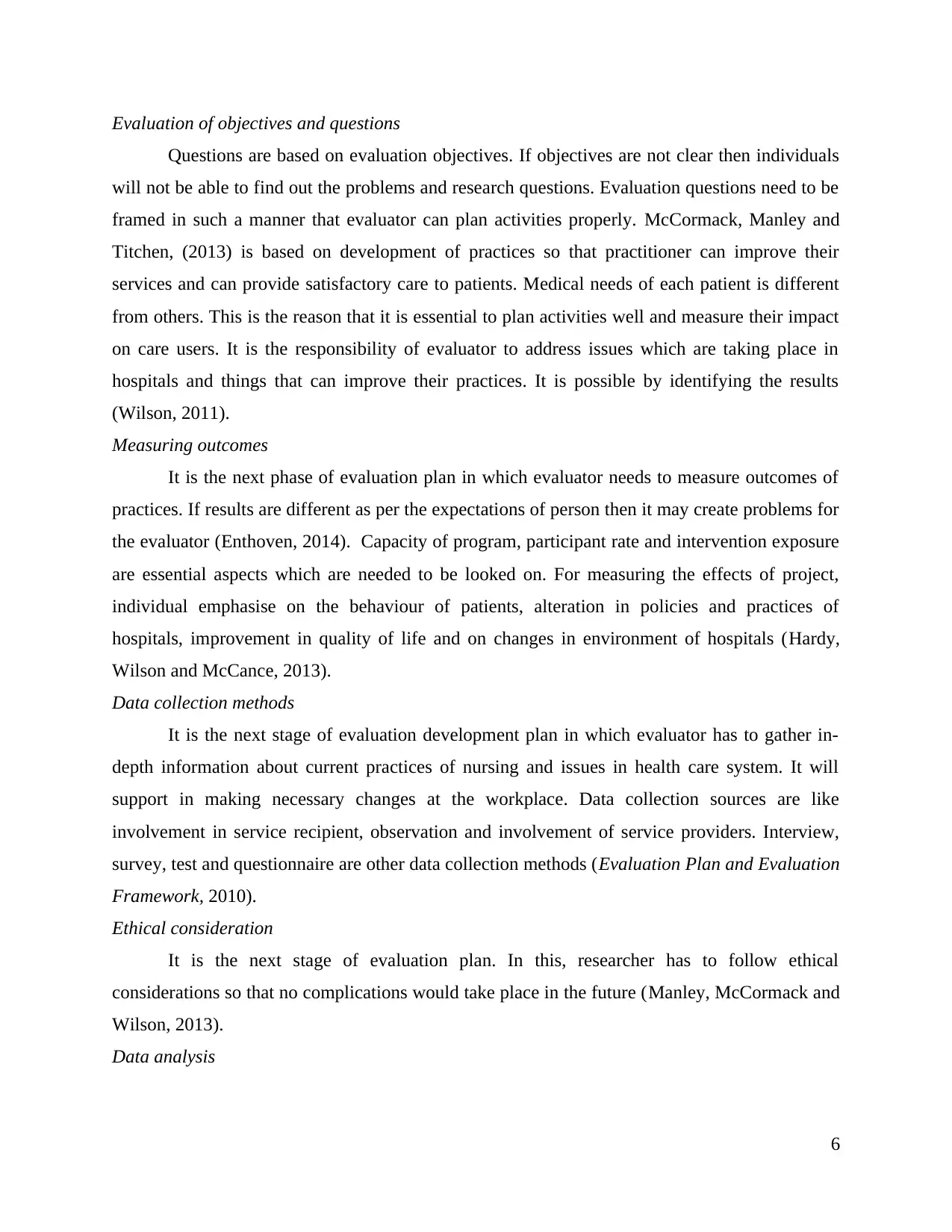
Evaluation of objectives and questions
Questions are based on evaluation objectives. If objectives are not clear then individuals
will not be able to find out the problems and research questions. Evaluation questions need to be
framed in such a manner that evaluator can plan activities properly. McCormack, Manley and
Titchen, (2013) is based on development of practices so that practitioner can improve their
services and can provide satisfactory care to patients. Medical needs of each patient is different
from others. This is the reason that it is essential to plan activities well and measure their impact
on care users. It is the responsibility of evaluator to address issues which are taking place in
hospitals and things that can improve their practices. It is possible by identifying the results
(Wilson, 2011).
Measuring outcomes
It is the next phase of evaluation plan in which evaluator needs to measure outcomes of
practices. If results are different as per the expectations of person then it may create problems for
the evaluator (Enthoven, 2014). Capacity of program, participant rate and intervention exposure
are essential aspects which are needed to be looked on. For measuring the effects of project,
individual emphasise on the behaviour of patients, alteration in policies and practices of
hospitals, improvement in quality of life and on changes in environment of hospitals (Hardy,
Wilson and McCance, 2013).
Data collection methods
It is the next stage of evaluation development plan in which evaluator has to gather in-
depth information about current practices of nursing and issues in health care system. It will
support in making necessary changes at the workplace. Data collection sources are like
involvement in service recipient, observation and involvement of service providers. Interview,
survey, test and questionnaire are other data collection methods (Evaluation Plan and Evaluation
Framework, 2010).
Ethical consideration
It is the next stage of evaluation plan. In this, researcher has to follow ethical
considerations so that no complications would take place in the future (Manley, McCormack and
Wilson, 2013).
Data analysis
6
Questions are based on evaluation objectives. If objectives are not clear then individuals
will not be able to find out the problems and research questions. Evaluation questions need to be
framed in such a manner that evaluator can plan activities properly. McCormack, Manley and
Titchen, (2013) is based on development of practices so that practitioner can improve their
services and can provide satisfactory care to patients. Medical needs of each patient is different
from others. This is the reason that it is essential to plan activities well and measure their impact
on care users. It is the responsibility of evaluator to address issues which are taking place in
hospitals and things that can improve their practices. It is possible by identifying the results
(Wilson, 2011).
Measuring outcomes
It is the next phase of evaluation plan in which evaluator needs to measure outcomes of
practices. If results are different as per the expectations of person then it may create problems for
the evaluator (Enthoven, 2014). Capacity of program, participant rate and intervention exposure
are essential aspects which are needed to be looked on. For measuring the effects of project,
individual emphasise on the behaviour of patients, alteration in policies and practices of
hospitals, improvement in quality of life and on changes in environment of hospitals (Hardy,
Wilson and McCance, 2013).
Data collection methods
It is the next stage of evaluation development plan in which evaluator has to gather in-
depth information about current practices of nursing and issues in health care system. It will
support in making necessary changes at the workplace. Data collection sources are like
involvement in service recipient, observation and involvement of service providers. Interview,
survey, test and questionnaire are other data collection methods (Evaluation Plan and Evaluation
Framework, 2010).
Ethical consideration
It is the next stage of evaluation plan. In this, researcher has to follow ethical
considerations so that no complications would take place in the future (Manley, McCormack and
Wilson, 2013).
Data analysis
6
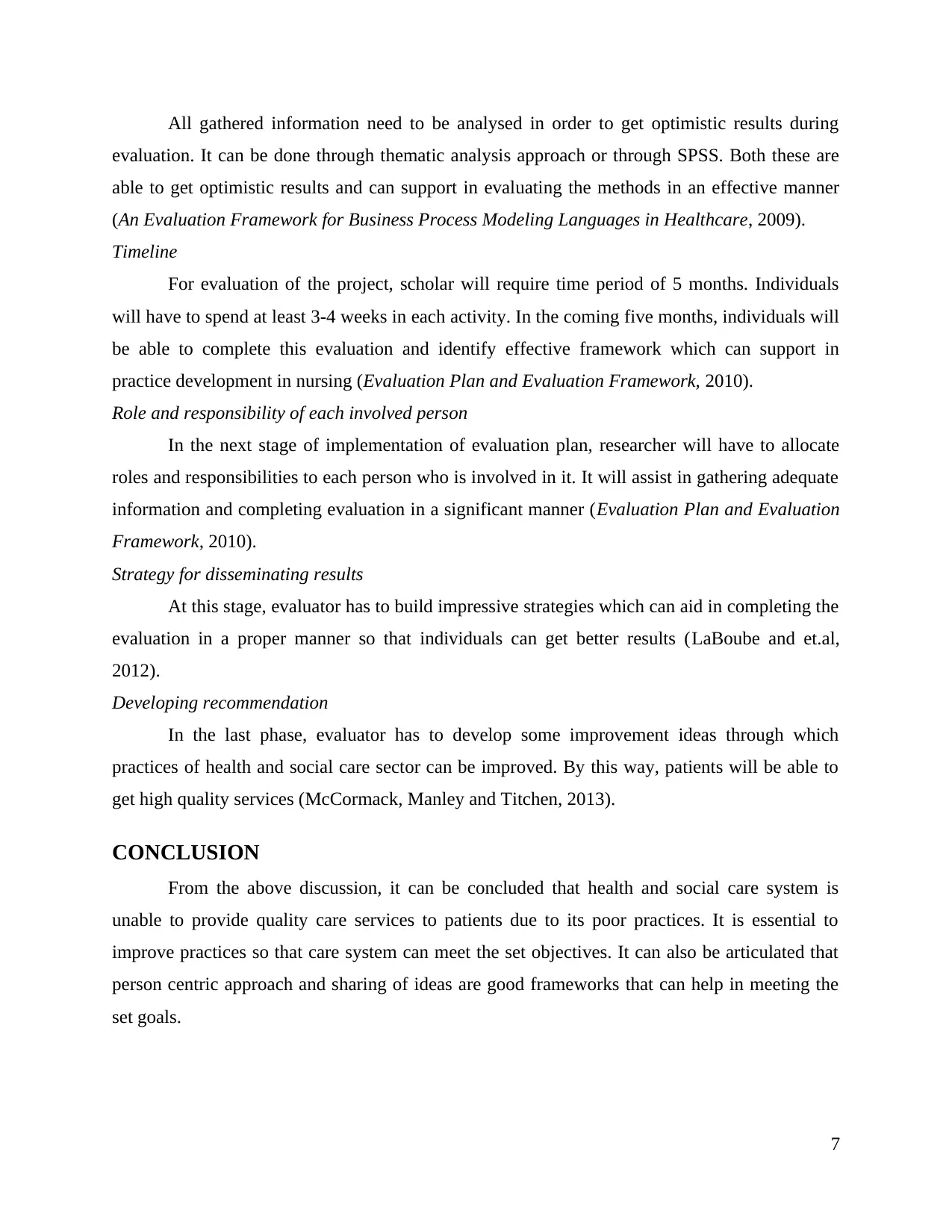
All gathered information need to be analysed in order to get optimistic results during
evaluation. It can be done through thematic analysis approach or through SPSS. Both these are
able to get optimistic results and can support in evaluating the methods in an effective manner
(An Evaluation Framework for Business Process Modeling Languages in Healthcare, 2009).
Timeline
For evaluation of the project, scholar will require time period of 5 months. Individuals
will have to spend at least 3-4 weeks in each activity. In the coming five months, individuals will
be able to complete this evaluation and identify effective framework which can support in
practice development in nursing (Evaluation Plan and Evaluation Framework, 2010).
Role and responsibility of each involved person
In the next stage of implementation of evaluation plan, researcher will have to allocate
roles and responsibilities to each person who is involved in it. It will assist in gathering adequate
information and completing evaluation in a significant manner (Evaluation Plan and Evaluation
Framework, 2010).
Strategy for disseminating results
At this stage, evaluator has to build impressive strategies which can aid in completing the
evaluation in a proper manner so that individuals can get better results (LaBoube and et.al,
2012).
Developing recommendation
In the last phase, evaluator has to develop some improvement ideas through which
practices of health and social care sector can be improved. By this way, patients will be able to
get high quality services (McCormack, Manley and Titchen, 2013).
CONCLUSION
From the above discussion, it can be concluded that health and social care system is
unable to provide quality care services to patients due to its poor practices. It is essential to
improve practices so that care system can meet the set objectives. It can also be articulated that
person centric approach and sharing of ideas are good frameworks that can help in meeting the
set goals.
7
evaluation. It can be done through thematic analysis approach or through SPSS. Both these are
able to get optimistic results and can support in evaluating the methods in an effective manner
(An Evaluation Framework for Business Process Modeling Languages in Healthcare, 2009).
Timeline
For evaluation of the project, scholar will require time period of 5 months. Individuals
will have to spend at least 3-4 weeks in each activity. In the coming five months, individuals will
be able to complete this evaluation and identify effective framework which can support in
practice development in nursing (Evaluation Plan and Evaluation Framework, 2010).
Role and responsibility of each involved person
In the next stage of implementation of evaluation plan, researcher will have to allocate
roles and responsibilities to each person who is involved in it. It will assist in gathering adequate
information and completing evaluation in a significant manner (Evaluation Plan and Evaluation
Framework, 2010).
Strategy for disseminating results
At this stage, evaluator has to build impressive strategies which can aid in completing the
evaluation in a proper manner so that individuals can get better results (LaBoube and et.al,
2012).
Developing recommendation
In the last phase, evaluator has to develop some improvement ideas through which
practices of health and social care sector can be improved. By this way, patients will be able to
get high quality services (McCormack, Manley and Titchen, 2013).
CONCLUSION
From the above discussion, it can be concluded that health and social care system is
unable to provide quality care services to patients due to its poor practices. It is essential to
improve practices so that care system can meet the set objectives. It can also be articulated that
person centric approach and sharing of ideas are good frameworks that can help in meeting the
set goals.
7
⊘ This is a preview!⊘
Do you want full access?
Subscribe today to unlock all pages.

Trusted by 1+ million students worldwide
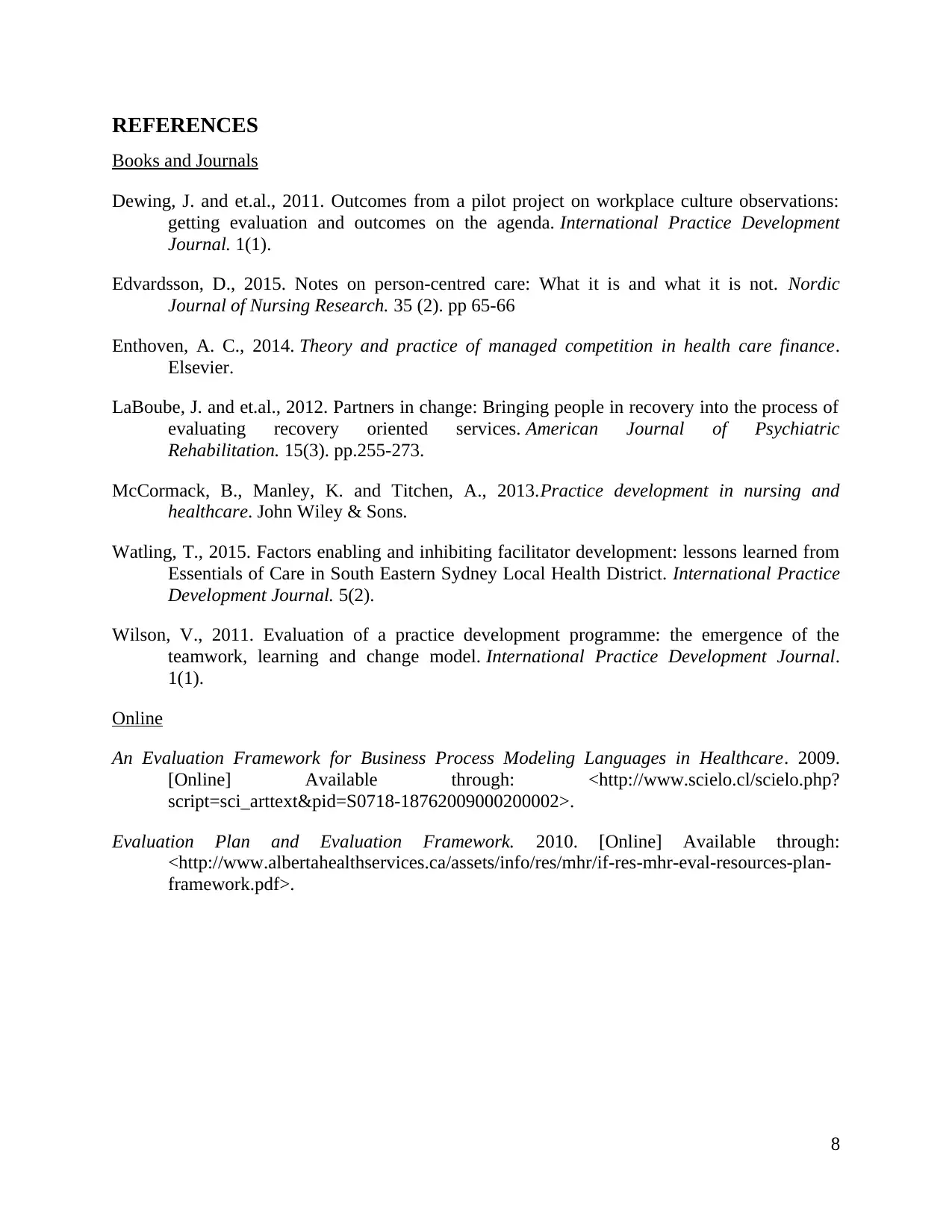
REFERENCES
Books and Journals
Dewing, J. and et.al., 2011. Outcomes from a pilot project on workplace culture observations:
getting evaluation and outcomes on the agenda. International Practice Development
Journal. 1(1).
Edvardsson, D., 2015. Notes on person-centred care: What it is and what it is not. Nordic
Journal of Nursing Research. 35 (2). pp 65-66
Enthoven, A. C., 2014. Theory and practice of managed competition in health care finance.
Elsevier.
LaBoube, J. and et.al., 2012. Partners in change: Bringing people in recovery into the process of
evaluating recovery oriented services. American Journal of Psychiatric
Rehabilitation. 15(3). pp.255-273.
McCormack, B., Manley, K. and Titchen, A., 2013.Practice development in nursing and
healthcare. John Wiley & Sons.
Watling, T., 2015. Factors enabling and inhibiting facilitator development: lessons learned from
Essentials of Care in South Eastern Sydney Local Health District. International Practice
Development Journal. 5(2).
Wilson, V., 2011. Evaluation of a practice development programme: the emergence of the
teamwork, learning and change model. International Practice Development Journal.
1(1).
Online
An Evaluation Framework for Business Process Modeling Languages in Healthcare. 2009.
[Online] Available through: <http://www.scielo.cl/scielo.php?
script=sci_arttext&pid=S0718-18762009000200002>.
Evaluation Plan and Evaluation Framework. 2010. [Online] Available through:
<http://www.albertahealthservices.ca/assets/info/res/mhr/if-res-mhr-eval-resources-plan-
framework.pdf>.
8
Books and Journals
Dewing, J. and et.al., 2011. Outcomes from a pilot project on workplace culture observations:
getting evaluation and outcomes on the agenda. International Practice Development
Journal. 1(1).
Edvardsson, D., 2015. Notes on person-centred care: What it is and what it is not. Nordic
Journal of Nursing Research. 35 (2). pp 65-66
Enthoven, A. C., 2014. Theory and practice of managed competition in health care finance.
Elsevier.
LaBoube, J. and et.al., 2012. Partners in change: Bringing people in recovery into the process of
evaluating recovery oriented services. American Journal of Psychiatric
Rehabilitation. 15(3). pp.255-273.
McCormack, B., Manley, K. and Titchen, A., 2013.Practice development in nursing and
healthcare. John Wiley & Sons.
Watling, T., 2015. Factors enabling and inhibiting facilitator development: lessons learned from
Essentials of Care in South Eastern Sydney Local Health District. International Practice
Development Journal. 5(2).
Wilson, V., 2011. Evaluation of a practice development programme: the emergence of the
teamwork, learning and change model. International Practice Development Journal.
1(1).
Online
An Evaluation Framework for Business Process Modeling Languages in Healthcare. 2009.
[Online] Available through: <http://www.scielo.cl/scielo.php?
script=sci_arttext&pid=S0718-18762009000200002>.
Evaluation Plan and Evaluation Framework. 2010. [Online] Available through:
<http://www.albertahealthservices.ca/assets/info/res/mhr/if-res-mhr-eval-resources-plan-
framework.pdf>.
8
1 out of 10
Related Documents
Your All-in-One AI-Powered Toolkit for Academic Success.
+13062052269
info@desklib.com
Available 24*7 on WhatsApp / Email
![[object Object]](/_next/static/media/star-bottom.7253800d.svg)
Unlock your academic potential
Copyright © 2020–2026 A2Z Services. All Rights Reserved. Developed and managed by ZUCOL.





